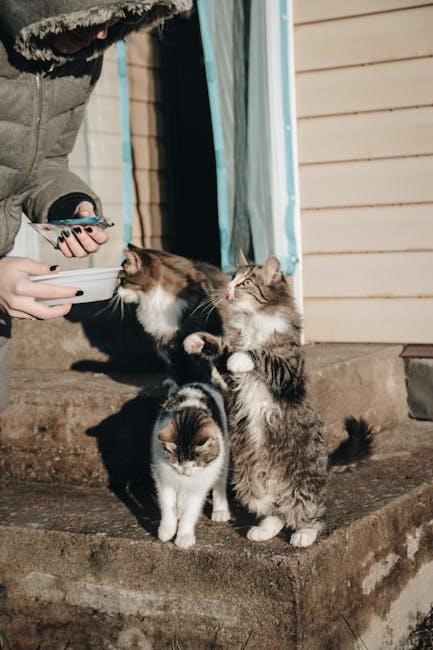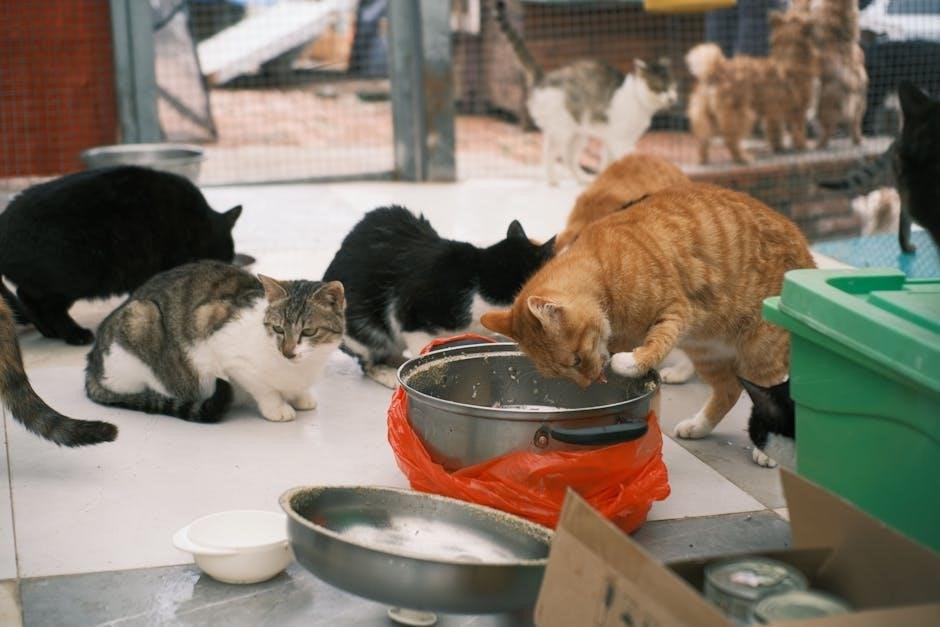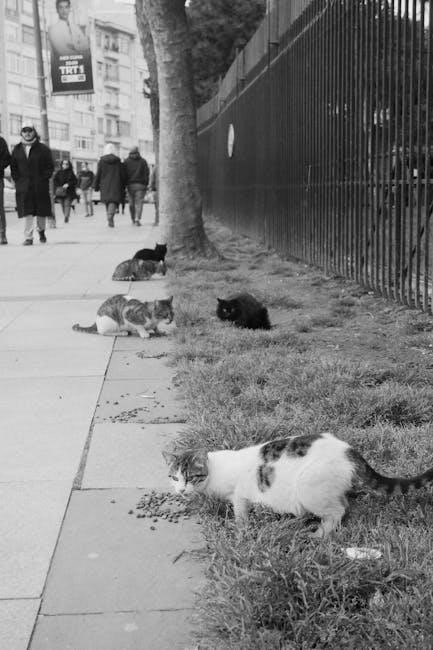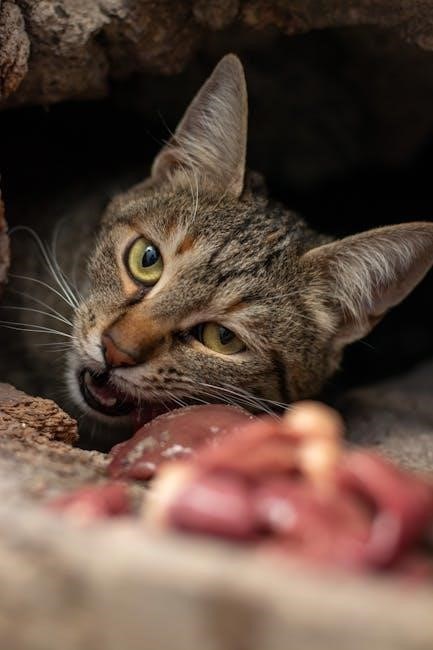Welcome to the Feed the Cats Program, a community-driven initiative focused on improving feline nutrition and well-being through education and innovative feeding strategies.
Overview of the Program
The Feed the Cats Program is a community-focused initiative designed to enhance feline health through proper nutrition and care. It emphasizes education, sustainable feeding practices, and collaboration with local volunteers and veterinarians to ensure cats receive balanced diets. The program aims to address food insecurity, promote preventative care, and foster a supportive environment for cat well-being in neighborhoods worldwide.
Objectives and Mission
The primary objective of the Feed the Cats Program is to ensure all cats receive adequate nutrition by providing high-quality food and promoting dietary awareness. Its mission is to eradicate feline hunger, improve health outcomes, and strengthen community bonds through collective responsibility, ensuring every cat thrives as a beloved and cared-for companion.

Understanding the “Feed the Cats Program”
Launched to improve feline well-being, the Feed the Cats Program is a community-based initiative providing education on proper feeding practices and ensuring consistent nutrition for cats everywhere.
What is the “Feed the Cats Program?”
The Feed the Cats Program is an initiative aimed at enhancing feline health by promoting proper feeding habits through educational resources and community engagement, ensuring cats receive the necessary nutrients for optimal well-being.
Key Components of the Program
The program includes educational workshops, custom feeding plans, and partnerships with veterinarians to ensure cats receive balanced diets tailored to their needs, fostering a healthier feline community through collective effort and expert guidance.
Target Audience and Beneficiaries
The program primarily targets cat owners, shelters, and community volunteers, providing resources to ensure cats receive proper nutrition. It also benefits stray and domestic cats by addressing food insecurity and promoting overall feline health through collective community efforts and educational outreach.
Nutritional Basics for Cats
Cats are obligate carnivores, requiring diets rich in protein and fat. Proper nutrition is essential for their health, preventing common diseases and ensuring optimal energy levels.
Cats as Obligate Carnivores
Cats are obligate carnivores, requiring diets rich in animal-derived protein and fat. Their bodies are designed to thrive on meat, with minimal need for carbohydrates. A lack of high-quality protein and fat can lead to malnutrition and health issues, emphasizing the importance of feeding them food tailored to their natural dietary needs.
Importance of Protein and Fat in Cat Diets
Protein and fat are crucial for cats, as they provide essential energy and support vital bodily functions. High-quality protein aids in muscle maintenance, while fat ensures proper skin and coat health. A diet deficient in these nutrients can lead to weight loss, weakened immunity, and chronic health issues, making balanced nutrition a priority for feline well-being.
How to Read Cat Food Labels
Reading cat food labels is essential to ensure your cat receives proper nutrition. Look for high-quality protein sources like chicken or salmon as the first ingredient. Avoid fillers and by-products. Check the guaranteed analysis for protein and fat content. Ensure the food meets AAFCO standards. Always follow serving guidelines and consult your veterinarian to tailor your cat’s diet to their specific needs and health conditions.
Implementing the “Feed the Cats Program”
Effective implementation involves community education, proper feeding techniques, and sustainable practices to ensure cats receive balanced nutrition and care. Collaboration with local volunteers and veterinarians is key to success.
Steps to Start the Program
Begin by assessing community needs, then recruit volunteers and collaborate with local veterinarians. Educate participants on proper feeding techniques and nutrition basics. Establish a sustainable food supply and create a feeding schedule. Monitor progress and gather feedback to ensure the program’s success and adaptability to community requirements.
Community Involvement and Participation
Engage local residents through volunteer opportunities, fostering a sense of responsibility for feline welfare. Partner with schools, businesses, and animal shelters to amplify outreach. Organize fundraising events and educational workshops to promote awareness and encourage active participation; Collaborate with veterinarians to ensure expert guidance and support for the program’s success.

Health Benefits of Proper Feeding
Proper feeding prevents diseases like diabetes and obesity, promoting longevity and vitality in cats. A balanced diet ensures optimal health and well-being for felines.
Link Between Diet and Common Feline Diseases
A poor diet can lead to obesity, diabetes, and urinary issues in cats. Veterinarians emphasize that low-quality ingredients and overfeeding contribute to these conditions. A balanced diet rich in protein and low in carbohydrates helps prevent such diseases, ensuring overall feline health and longevity. Proper nutrition is key to avoiding these common health problems in cats.
Preventative Care Through Nutrition
Nutrition plays a vital role in maintaining feline health. High-quality diets rich in protein and omega-3 fatty acids support immune function and coat health. Avoiding fillers and by-products helps prevent digestive issues. Regular feeding schedules and portion control can reduce the risk of obesity and related disorders, promoting overall well-being and longevity in cats.
Challenges and Solutions
The program addresses food insecurity and ensures access to high-quality nutrition through community-driven feeding initiatives and educational resources.
Addressing Food Insecurity for Cats
The program tackles feline food insecurity by providing consistent, nutritious meals through community partnerships and donations. Emphasizing high-protein diets, it ensures cats receive the sustenance they need to thrive, addressing malnutrition and related health issues effectively, while promoting a culture of care and responsibility within neighborhoods.
Overcoming Common Feeding Challenges
Ensuring consistent, high-quality meals for cats can be challenging due to busy lifestyles and picky eaters. Automated feeding solutions and scheduling apps help maintain routines, while portion control measures prevent overfeeding. Veterinarian guidance ensures personalized diets, addressing specific needs and reducing waste, fostering healthier, more balanced nutrition for felines.

Role of the Community
The community plays a vital role by actively participating in feeding initiatives, volunteering, and spreading awareness about proper cat nutrition and care.
Volunteer Opportunities and Contributions
Volunteers are the backbone of the Feed the Cats Program, contributing time, resources, and skills to ensure cats receive proper nutrition. Opportunities include feeding, fundraising, and educating the community about feline care. Contributions, whether monetary or in-kind, directly support program operations and expand its reach. Together, volunteers and donors make a meaningful difference in improving cats’ lives and well-being.
Collaboration with Local Veterinarians
The Feed the Cats Program partners with local veterinarians to ensure feline dietary needs are met. Veterinarians provide expert guidance on nutrition, helping to create balanced feeding plans and educate the community on preventing diet-related diseases. Their involvement strengthens the program’s mission, fostering healthier cats and a more informed community.

Technology and Innovation
The Feed the Cats Program leverages technology to enhance feeding efficiency. Automated feeders and mobile apps streamline feeding schedules, ensuring consistent nutrition while reducing waste and improving convenience for cat owners.
Automated Feeding Solutions
Automated feeding solutions are revolutionizing cat care in the Feed the Cats Program. Smart feeders, equipped with timers and portion control, ensure cats receive consistent meals. These devices can be programmed via apps, allowing owners to monitor feeding schedules remotely. Sensors detect food levels, preventing overfeeding and reducing waste. This technology promotes a stress-free environment for both cats and owners, ensuring optimal nutrition and convenience.
Using Apps for Feeding Schedules
Apps are enhancing the Feed the Cats Program by enabling owners to schedule and monitor feeding times remotely. Features include customizable feeding plans, portion control, and notifications for low food levels. These tools reduce overfeeding risks and ensure consistency, especially for busy owners or those managing multiple cats. Apps also support cats with special dietary needs, making feeding more efficient and stress-free.
Sustainability Practices
Sustainability Practices involve promoting eco-friendly feeding options and reducing waste, ensuring high-quality nutrition while minimizing environmental impact through community-driven initiatives and mindful resource management.
Eco-Friendly Feeding Options
Eco-friendly feeding options emphasize biodegradable packaging, organic cat food, and reusable feeding systems. These sustainable choices reduce environmental impact while maintaining high nutritional standards, promoting healthier cats and a greener planet through responsible pet care practices;
Reducing Waste in Cat Feeding
Reducing waste involves portion control, using recyclable materials, and minimizing excess food. Proper meal planning and storage solutions help lower environmental impact while ensuring cats receive balanced nutrition, aligning with sustainable and responsible pet care practices.
Future Directions
Expanding outreach and enhancing educational resources aim to ensure all cats receive optimal care, fostering a community committed to feline well-being and nutrition.
Expanding the Program’s Reach
By fostering partnerships with local shelters and veterinarians, the program aims to extend its impact, ensuring more cats receive proper nutrition. Educational campaigns and community workshops will play a crucial role in spreading awareness and engaging participants nationwide, creating a supportive network for feline care and well-being.
Continuous Education and Awareness
Regular workshops and online resources provide cat owners with updated knowledge on feline nutrition and health. Collaborations with veterinarians ensure accurate information, empowering owners to make informed decisions. This ongoing education fosters a community dedicated to improving the lives of cats through proper feeding and care practices, supported by expert guidance and the latest research.